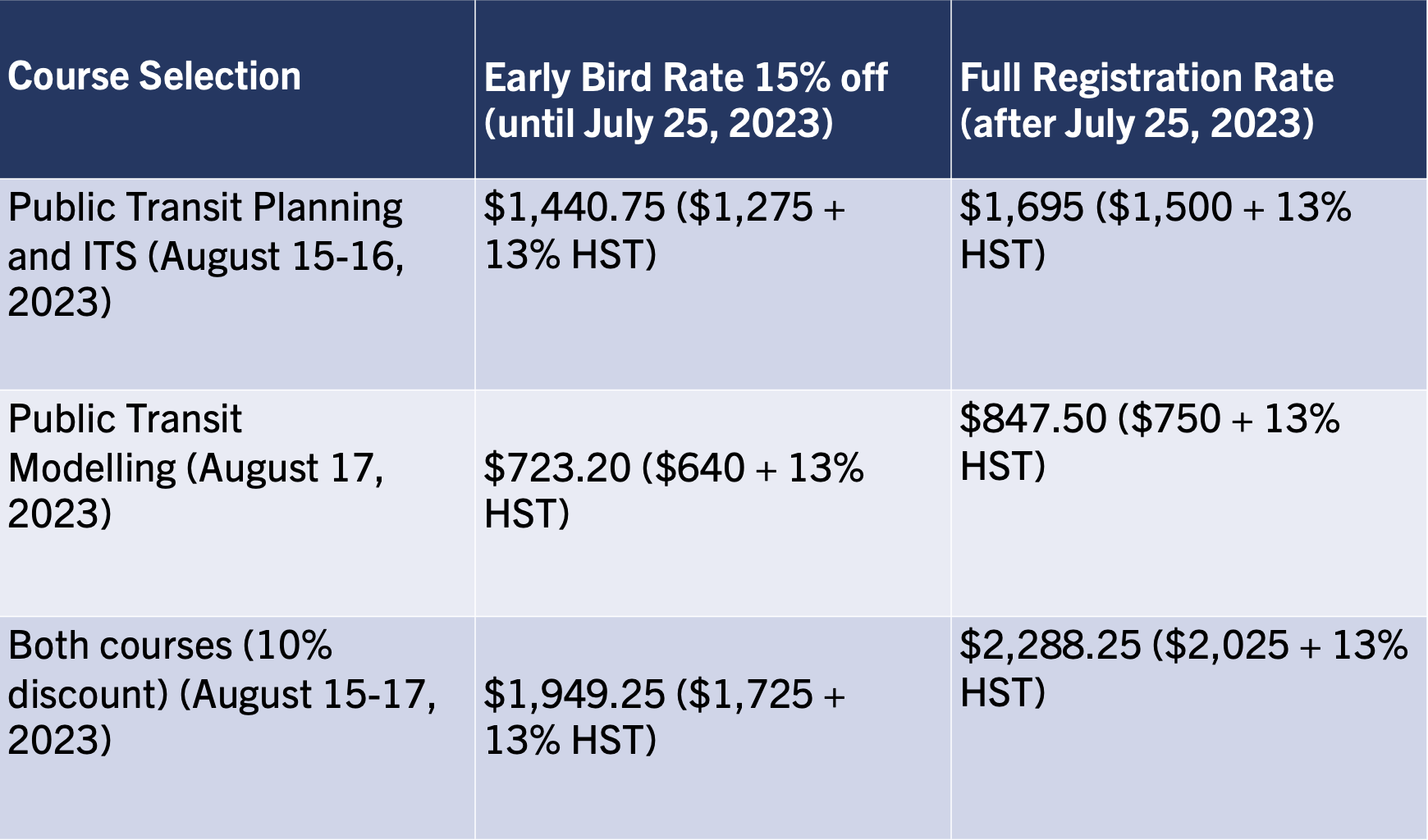2024 U of T Transportation Alumni Reception
Join us for a night of networking and fun at the 4th University of Toronto Transportation Alumni Reception at the Duke of York on Wednesday, March 6th from 6:00 to 9:00pm. This is your chance to reconnect with old friends and make new connections in the transportation industry. The event will feature light appetizers and an opportunity to catch up with fellow alumni, faculty, friends and students who are all working in the transportation field. Don't miss out on this chance to be a part of the University of Toronto transportation community.
The Duke of York is located at 39 Prince Arthur Ave., Toronto, ON M5R 1B2.
Tickets include light refreshments and all proceeds support UTTAN activities including student programming such as our annual student case competition. Cash bar.
Please join us and share this invitation with fellow U of T grads working in transportation!
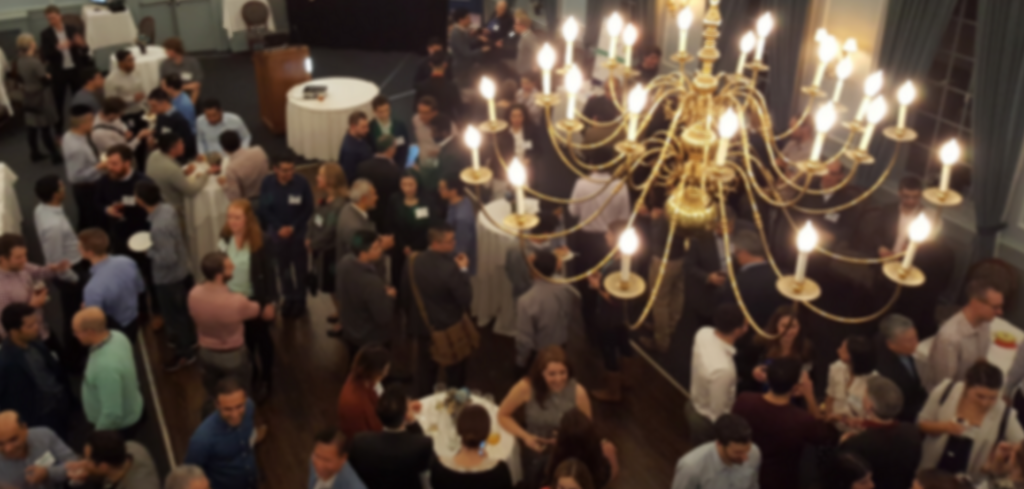
Registration
Register for this event on Eventbrite.
A big thank you to our sponsors for making this event possible!
We thank our sponsors, HDR, CIMA+, Arcadis IBI Group.
Accessibility
If any specific accommodations are needed to attend this event, please contact mobilitynetwork@utoronto.ca as early as possible.
Questions?
Contact us at mobilitynetwork@utoronto.ca.
About the University of Toronto Transportation Alumni Network (UTTAN)
Established in 2018 to bring together generations of U of T graduates who work in transportation, UTTAN is a volunteer-run alumni community that plans events and programs for alumni and current U of T students interested in the transportation field.
Connect with us on Facebook or LinkedIn and subscribe to email updates.
The Mobility Network Summer School 2023 entered its second day with an intensive focus on policy analysis and evaluation. Participating students worked diligently in teams, crafting comprehensive policy briefs that assessed transportation infrastructure investments through the lens of economic, climate, and societal impacts.
One of the groups at the Summer School, consisting of Madeleine Bonsma, Jean Schmitt, Mara Bender, Emily Farrar, and Suzan Rakha, created the following policy briefs focusing on Hazel McCallion LRT.
The Hazel McCallion LRT line can be beneficial to the region by improving transit network and access to opportunity within the regions, as supported by aggressive modal share and ridership forecasts published by Metrolinx.
As it stands, there is good economic development potential, as well as TOD potential. However, extending the line into Brampton could further maximize the economic and land development potential within proximity to the project. Under the current alignment, the pertinent levels of government are largely supportive of TOD land use policies (City of Mississauga, City of Brampton, Region of Peel, and Province of Ontario).
The LRT will reduce GHG emissions and air pollutants. Health benefits will be improved due to reduced air pollutants and previsions for resilience to future weather events. User benefits in travel time will be reduced with grade separated LRT, as well as decreased friction with automobiles. However, it could be further increased by offboard fare collection and enclosed shelters/stations.
The project represents a good opportunity for the region to implement key rapid transportation infrastructure that addresses regional mobility needs, transportation decarbonization, future growth and development, and reductions in operational costs.
iCity2 will address Ontario's needs for improved sustainable, equitable mobility and affordable housing for residents of the GGH by focussing on crucial challenges facing cities today. Co-located at the University of Toronto and OCAD University, iCity2 draws on faculty expertise in transportation engineering, computer science, visual analytics, geographic information science, urban planning, economics, sociology, architecture, and design. It builds on the research products of decades of development of urban transportation simulation models, unprecedented access to data, computer-aided design, and knowledge of the GGH, our urban laboratory. iCity 2 is complemented by partnerships among academic researchers, mobility start-ups, technology firms, engineering, data and analytics firms, property developers, not-for-profits, and municipal and regional governments, creating an urban innovation ecosystem that ensures iCity 2.0 will achieve research impact with solutions that will be applied to improving mobility, sustainability, equity and affordability, regionally and globally.
Agenda
8:30 a.m. Registration and light breakfast available.
9:00 Welcome
Professor Eric Miller, Director, Mobility Network
9:10 Project Overview
Professor Eric Miller, Director, Mobility Network
- Overview, team and partners
- ORF funding requirements
- Project management approach
- Year 2 Work Plan and Goals
9:30 Emerging Mobility Technology and Services
Professor Steven Farber
- Current and emerging services
- Modelling services
- Field tests
10:10 Break
10:30 Building Complete Communities
Dr. Sara Diamond, President Emerita, OCAD University
Professor Eric Miller, Director, Mobility Network
- Scorecards
- Generative design
- Case studies
- Affordability analysis and modelling
11:30 Break
11:50 Integrated mobility networks
Professor Amer Shalaby, Director, Transit Analytics Lab
- Modelling travel markets and needs
- Generative design
- Tactical improvement strategies
12:30 p.m. Lunch
1:00 End of meeting
Invitation-only.
If any specific accommodations are needed, please contact mobilitynetwork@utoronto.ca. Requests should be made as early as possible.
On behalf of the University of Toronto’s Mobility Network, Urban Climate Action Project, and the Climate Positive Energy initiative, the SDGs@UofT Initiative, as well as the City of Toronto, I am pleased to invite you to attend a workshop focused on pathways to the adoption and implementation of low-carbon mobility. Titled Low-Carbon Mobility Workshop, this event is the first in a three-part workshop series designed to facilitate the exchange and mobilization of both practitioner and research knowledge in advancing the City's TransformTO Net Zero Strategy.
This workshop will focus on the challenges of and opportunities for meeting the TransformTO goal of having 75% of trips in Toronto under 5 km walked, biked, or taken by transit by 2030.
About the Workshop
Conversations at this event will explore: (i) potential policy frameworks that would serve as enablers towards sustainable low-carbon mobility; (ii) financing mechanisms to support strategic, technical and modelling studies, as well as implementation of their recommendations; (iii) successful initiatives and best practices towards decarbonisation of mobility from other jurisdictions from which to draw lessons and identify gaps and potential areas of future intervention; (iv) transportation and mobility planning for advancing the decarbonisation agenda, with an emphasis on urban land use, public-transport, urban to suburban connectivity, and active transportation considerations; and (v) opportunities to achieve community priorities and co-benefits (e.g., health, wellbeing, clean air, calm streets etc.) through sustainable low-carbon mobility solutions.
About the Series
In addition to convening and engaging diverse academic and non-academic actors in solutions-focused conversations, this workshop series will provide students involved with valuable skills and experience in interdisciplinary, community-based, equity-focused research and opportunities for professional development and networking in their field.
Accessibility Statement
We strive to host inclusive, accessible events that enable all individuals, including individuals with disabilities, to engage fully. To be respectful of those with allergies and environmental sensitivities, we ask that you please refrain from wearing strong fragrances. To request an accommodation or for inquiries about accessibility for this event, please contact Emily Smit, emily.smit@utoronto.ca.
This event is invitation only. If you would like to attend this event, please contact Kim Slater, kim.slater@utoronto.ca.
The Suburban Mobilities Cluster at the University of Toronto Scarborough is a multi-disciplinary research program that draws on expertise across nine disciplines to tackle four suburban mobility challenges: rising suburban inequalities, improving transportation design and technology, increasing transportation impacts on climate change, emerging stakes on resilience to shocks.
Suburban Mobilities is part of the Mobility Network, a network of partners, in the community, in industry, and in government, who will collaborate to find mobility solutions that serve people’s well-being, the planet’s future, and the potential of our growing cities to flourish equitably, sustainably and productively.
As a pillar of the GTA-RISE institute, the cluster will develop an integrated UTSC approach to collaborative research, while leveraging faculty resources and university institutions across the tri-campus, such as the Mobility Network, The School of Cities, and the University of Toronto Transportation Research Institute.
Agenda
9:30 a.m. Welcome and Land Acknowledgement
- Steven Farber, Associate Professor, Department of Human Geography, University of Toronto Scarborough. Director of Suburban Mobilities Cluster
9:40 Introduction: The cluster and the Scarborough Survey
- Ignacio Tiznado-Aitken, Postdoctoral fellow, Department of Human Geography, University of Toronto Scarborough, Research Coordinator of Suburban Mobilities Cluster
10:05 Predictors of Transportation-Related Barriers to Healthcare Access
- Nicholas Spence, Assistant Professor, Department of Health & Society, University of Toronto Scarborough
10:30 Active travel among older adults in suburban contexts: A mixed-methods approach
- Alec Khachatryan, PhD student, Department of Geography and Planning, University of Toronto
10:55 Coffee Break
11:10 15-minute city in Scarborough
- Anton Yu, Master student, Department of Human Geography, University of Toronto Scarborough
11:35 Relationships between accessibility and quality of life outcomes
- Joao Parga, PhD student, Department of Geography and Planning, University of Toronto
12:00 p.m. The way forward: Future research with the Scarborough Survey
- Shaila Jamal, Postdoctoral fellow, Department of Human Geography, University of Toronto Scarborough, Research Coordinator of Suburban Mobilities Cluster
12:25 Lunch and closing remarks
Download the Suburban Mobilities Cluster Day agenda.
Registration
Register on Eventbrite for this event.
Free. All are welcome.
If any specific accommodations are needed, please contact mobilitynetwork@utoronto.ca. Requests should be made as early as possible.
Transportation is the largest emitting sector of GHG in Ontario, responsible for 32% of emissions in 2020.
Today, 94% of Ontario’s electricity generation is emissions free.
Are we all set to cruise into a sustainable EV future or is there more to it?
Speakers
Steve Easterbrook is the Director of the School of the Environment and Professor of Computer Science at the University of Toronto. He received his Ph.D. (1991) in Computing from Imperial College in London (UK), and joined the faculty at the School of Cognitive and Computing Science, University of Sussex. From 1995-99, he was lead scientist at NASA´s Katherine Johnson Independent Verification and Validation Facility in West Virginia, where he investigated software verification on the Space Shuttle Flight Software, the International Space Station, and the Earth Observation System. He moved to the University of Toronto in 1999. His research interests range from modelling and analysis of complex adaptive systems to the socio-cognitive aspects of team interaction. His current research is in climate informatics, where he studies how climate scientists develop computational models to improve their understanding of earth systems and climate change, and the broader question of how that knowledge is shared with other communities. He has been a visiting scientist at the UK Met Office Hadley Centre, in Exeter; the National Centre for Atmospheric Research, in Boulder, Colorado; the Max-Planck Institute for Meteorology, in Hamburg; and, the Institute Pierre Simon Laplace, in Paris.
Olivier Trescases is a professor in the Edward S. Rogers Sr. Department of Electrical & Computer Engineering. He is the director of the University of Toronto Electric Vehicle Research Centre, where he is participating in multi-disciplinary collaborations with leading automotive suppliers and OEMs. His expertise is in the area of energy management, high-frequency/high-density power electronics, battery management systems, electric vehicles and power integrated circuits, including wide bandgap semiconductors.
Dianne Zimmerman is the City of Mississauga’s environment manager where she works with City departments and external stakeholders to identify innovative projects that will help Mississauga transition to a net-zero city. Dianne brings more than twenty five years of private and public sector experience in climate and clean energy policy, project implementation and strategic leadership. Prior to joining the City, she led Partners in Project Green, a program designed to advance sustainability efforts with businesses and municipalities in the Greater Toronto Area. Before that, she was the director of transportation for the Pembina Institute finding solutions to reduce freight emissions and support increased transit efficiency. From 2001 to 2015, Dianne worked for Suncor Energy advancing climate efforts and advocating for renewable energy policies.
Moderator
Marianne Hatzopoulou is Professor in the Department of Civil and Mineral Engineering at the University of Toronto and Tier 1 Canada Research Chair in Transport Decarbonization and Air Quality. She leads the Transportation and Air Quality (TRAQ) research group studying the interactions between transportation, air quality, climate change, and public health; she published 150 publications on these topics. Prof. Hatzopoulou is also the Director of Positive Zero Transport Futures, a living lab ecosystem for testing transport decarbonization innovations with positive societal outcomes. Prof. Hatzopoulou is on the Canadian team of researchers who were the 2021 recipients of the NSERC Brockhouse Canada Prize for Interdisciplinary Research in Science and Engineering. In 2022, she received the University of Toronto Engineering Alumni Network 2T5 Mid-Career Achievement Award. She is an associate editor of the journal Transportation Research Part D: Transport and Environment and the incoming chair for the Transportation Research Board Standing Committee on “Air Quality and Greenhouse Gas Mitigation” (2023-2026).
Register to attend
Register on Eventbrite for this virtual event.
Free. All are welcome.
If any specific accommodations are needed, please contact mobilitynetwork@utoronto.ca. Requests should be made as early as possible.
About The Way Forward
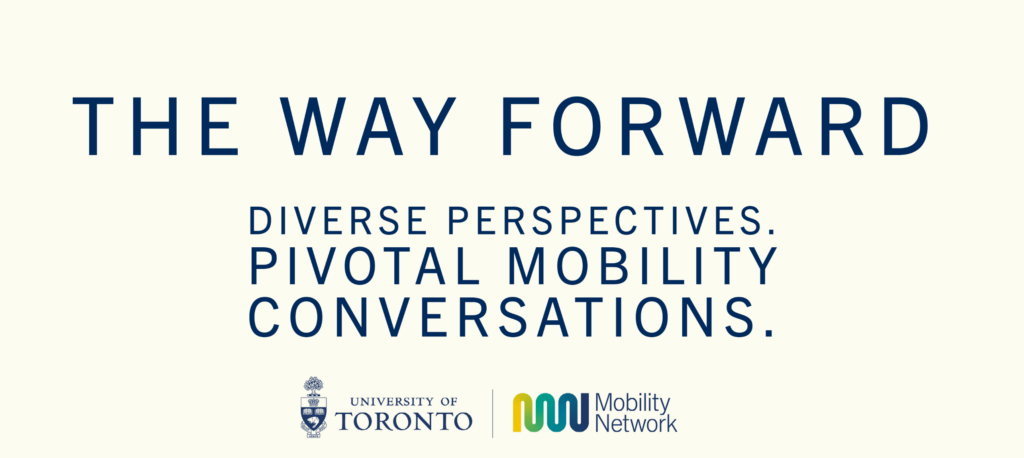
Explore the many ways mobility affects our lives at The Way Forward, a panel discussion series. Join the conversation!
All sessions take place online on Tuesdays from 4:00 p.m. to 5:00 p.m. and are free. Registration is required.
An introductory overview will be followed by short presentations, a moderated panel discussion, and audience Q & A. This event will be recorded and shared.
Interested in more The Way Forward sessions?
See the complete Spring 2023 schedule for The Way Forward.
Back in 2013 it was estimated that congestion in the GTHA resulted in $11 million in annual lost productivity, and things haven’t improved. Toronto is the most congested city in Canada, and ranks as third most congested in North America. In 2022, average travel speeds during peak commute periods were 32 km/h, compared to 50 km/h in 2019; the average traveller lost 118 hours commuting.
How can Intelligent Transportation Systems and transit help us get more out of existing infrastructure to reduce congestion?
Speakers
Baher Abdulhai is a professor in the Department of Civil & Mineral Engineering at the University of Toronto. He has 33 years of experience in transportation systems engineering and Intelligent Transportation Systems (ITS).Prof. Baher Abdulhai has 33 years of experience in transportation systems engineering and Intelligent Transportation Systems (ITS).He is the founder and Director of the Toronto ITS Centre and the founder and co-Director of the Centre for Automated and Transformative Transportation Systems. Abdulhai received several awards. In 2014, he won the University of Toronto Inventor of the Year Award for MARLIN, an artificial intellegence-based, self-learning, self-collaborating adaptive signal control. Most recently, in 2021, he won the Ontario Professional Engineers Awards Engineering Medal for career Engineering Excellence.
Tim LaChapelle has over 28 years of software development leadership experience in multiple markets from Aircraft Communications, Medical Systems Instrumentation & Data Analysis, Global Internet Optimization, and many other big-data markets in commercial industry. In his last 12 years at PARSONS, Tim spent 10-years leading the technical execution in our National Security business segment, helping to drive innovation and completion of key strategic national cybersecurity initiatives, and especially the last two years helping to lead the digital transformation of PARSONS’ aviation, rail, transit, intelligent infrastructure, environmental, and energy businesses. As Chief Digital Officer at PARSONS, Tim continues to leverage his skills to push technical innovation and digital transformation across PARSONS’ federal and critical infrastructure businesses to ensure a more resilient and sustainable world for customers and his family (wife, Laura, and their four children) located near Baltimore, Maryand.
Amer Shalaby is Professor and Bahen/Tanenbaum Chair in Civil Engineering at the University of Toronto. He is the founding Director of the Transit Analytics Lab (TAL) and Co-Director of the Centre for Automated and Transformative Transportation Systems (CATTS). Dr. Shalaby is specialized in transit planning and scheduling, intelligent transit systems, transit operational management, transit system resilience, automated and connected transit technologies, and simulation and modelling of transportation systems. He has served on various technical committees and journal editorial boards. He also served on advisory panels of multiple transportation projects in Canada and internationally.
Moderator
Dr. Judy Farvolden is the founding managing director of Mobility Network at the University of Toronto. Prior to that, she was the founding executive director of the University of Toronto Transportation Research Institute. Through an extensive network of industry and government partners she identifies opportunities to apply the University of Toronto’s broad and deep transportation research expertise to realize a future of seamless, integrated mobility that enhances access and equity, and mitigates climate impacts. Dr. Farvolden serves on the board of the Canadian Urban Institute, the advisory board of the Urban Land Institute, Toronto Chapter, the Toronto Region Board of Trade’s Council on Goods Movement, the City of Vaughan’s Smart Cities Advisory Task Force and the editorial advisory board of Electric Autonomy Canada. Prior to joining UTTRI, Dr. Farvolden held senior management positions in several Toronto start-up companies and consulted on financial technology management. She holds advanced degrees in both engineering and planning: a PhD from Princeton University in transportation and operations research and a master’s degree in urban planning from the University of Toronto. She received a Certificate in Public Policy through Harvard Kennedy Executive Education in October 2021.
Register to attend
Register on Eventbrite for this virtual event.
Free. All are welcome.
If any specific accommodations are needed, please contact mobilitynetwork@utoronto.ca. Requests should be made as early as possible.
About The Way Forward

Explore the many ways mobility affects our lives at The Way Forward, a panel discussion series. Join the conversation!
All sessions take place online on Tuesdays from 4:00 p.m. to 5:00 p.m. and are free. Registration is required.
An introductory overview will be followed by short presentations, a moderated panel discussion, and audience Q & A. This event will be recorded and shared.
Interested in more The Way Forward sessions?
See the complete Spring 2023 schedule for The Way Forward.
Above: Professor Jinhua Zhao delivers Distinguished Lecture at Sidney Smith Hall, University of Toronto, March 27, 2023. (Photo: Pat Doherty).
Mobility Network was proud to co-host a visit by Professor Jinhua Zhao, the Edward and Joyce Linde Associate Professor of City and Transportation Planning at the Massachusetts Institute of Technology (MIT), on March 27 and 28, 2023. Prof. Zhao is well-known for his work at the MIT Mobility Initiative and as the host for the popular virtual weekly seminar series, MIT Mobility Forum.
Zhao came to Toronto to deliver the Distinguished Lecture for the Department of Civil and Mineral Engineering, "Behavior and computation: What defines the future of urban mobility?" the evening of March 27.
Though his visit was short, Zhao was generous with his time. In addition to delivering his public lecture and taking part in the subsequent panel discussion, Zhao met with several U of T faculty, made a guest appearance at Professor Eric Miller's graduate course "Cities as Complex Systems," and met with transportation engineering graduate students at a research roundtable.
The Distinguished Lecture event drew a large crowd.
In his welcoming remarks, Professor Brent Sleep, Chair of the Department of Civil and Mineral Engineering, said, "It's always great to see such a tremendous turnout for these Distinguished Lectures that are transportation-related. Every year I think transportation wins the prize for the widest and greatest and most number of people coming out from not just within the university, but from outside the university as well."
Professor Zhao captured audience attention from the start of his lecture.
I want to introduce a way of looking at transportation that I find rewarding.
Over time, throughout human history, we invented a fantastic set of technologies that help us move from point A to point B. Many from MIT and University of Toronto contributed to some of this design and implementation of the system.
But the question is, is the technology innovation necessarily translating into the betterment of the transportation and mobility system? That's the question I would ask.
Professor Jinhua Zhao, March 27, 2023
He explained his views in detail, drawing from research studies and sharing compelling arguments illustrated with relevant examples that always drove his points home.
Behaviour thinking is really good at identifying opportunities, while computational thinking is the one that offers the foundation, the solution to it. My research really tries to bring the two together. And you bring them together to shape individual behaviour, design systems, and reform policies.
Professor Jinhua Zhao, March 27, 2023
Following his lecture, Zhao joined Ryan Lanyon (TTC) and Professor Amer Shalaby (U of T) for a panel discussion moderated by Professor Marianne Hatzopoulou (U of T).
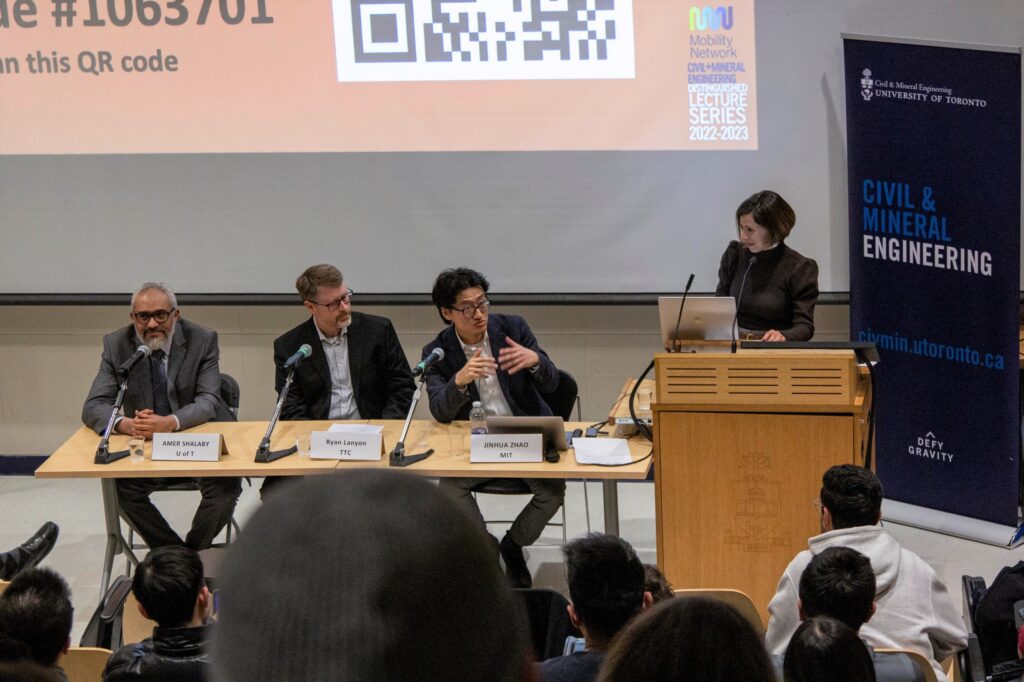
Prof. Hatzopoulou asked the panelists questions received from the audience and also blended in her own questions. Panel discussion topics ranged from a theoretical standard for basic access to mobility as a human right to the social nature of transportation.
Watch the video recording of "Behaviour and computation: What defines the future of urban mobility?"
Abstract
The transportation world is booming but in flux: the industry is being reshuffled, communities and cities are often confused and anxious about their mobility future, and the ecosystem pressure is daunting.
Mobility is in the midst of profound transformation with an unprecedented combination of new technologies: autonomy, electrification, connectivity, and AI, meeting new evolving priorities: decarbonization, public health, and social justice.
In this talk, Professor Zhao sharply focuses on two forces that drive the mobility future: behaviour and computation.
Behaviorally he investigates: Is travel social? Is travel emotional? And is travel perceptual? He uses a behavioural lens to examine mobility technologies and translates business decisions into a set of behavioural inquiries. Every single organization or company exists to change someone’s behaviour.
Computationally, he brings AI and machine learning methods to sense, predict, nudge and regulate travel behaviour. He demonstrates the power of bringing behavioural and computational thinking together, in order to make mobility services predictive, individualized, and experimental. He will illustrate how to design multimodal mobility systems that integrate shared and autonomous services with public transit.
Panel discussion to follow
Following his talk, Professor Zhao will be joined by Ryan Lanyon, Manager of New Technology and Innovation at the TTC, and Professor Amer Shalaby, Director of the Transit Analytics Lab, for a panel discussion moderated by Professor Marianne Hatzopoulou, Director of Positive Zero Transport Futures.
About Professor Jinhua Zhao
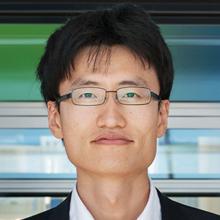
Jinhua Zhao is the Edward and Joyce Linde Associate Professor of City and Transportation Planning at the Massachusetts Institute of Technology (MIT). He integrates behavioral and computational thinking to decarbonize the global mobility system.
Prof. Zhao founded and directs the MIT Mobility Initiative, coalescing the Institute’s efforts on transportation research, education, entrepreneurship, and civic engagement. He hosts the MIT Mobility Forum, curating cutting-edge transportation research across the globe. Prof. Zhao directs the JTL Urban Mobility Lab and Transit Lab at MIT. He leads long-term collaborations with transportation authorities and operators worldwide, including London, Chicago, Washington DC, and Hong Kong and enables cross-culture learning between cities in North America, Asia and Europe. He develops methods to sense, predict, nudge, and regulate travel behavior, and designs multimodal mobility systems that integrate autonomous vehicles, shared mobility, and public transport. He is the co-founder and chief scientist for TRAM Global, a mobility decarbonization venture.
About the panel
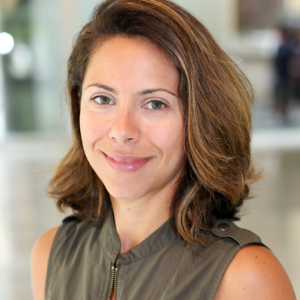
Marianne Hatzopoulou, moderator
Marianne Hatzopoulou is Professor in the Department of Civil and Mineral Engineering at the University of Toronto and Tier 1 Canada Research Chair in Transport Decarbonization and Air Quality. She leads the Transportation and Air Quality (TRAQ) research group studying the interactions between transportation, air quality, climate change, and public health; she published 150 publications on these topics. Prof. Hatzopoulou is also the Director of Positive Zero Transport Futures, a living lab ecosystem for testing transport decarbonization innovations with positive societal outcomes. Prof. Hatzopoulou is on the Canadian team of researchers who were the 2021 recipients of the NSERC Brockhouse Canada Prize for Interdisciplinary Research in Science and Engineering. In 2022, she received the University of Toronto Engineering Alumni Network 2T5 Mid-Career Achievement Award. She is an associate editor of the journal Transportation Research Part D: Transport and Environment and the incoming chair for the Transportation Research Board Standing Committee on “Air Quality and Greenhouse Gas Mitigation” (2023-2026).

Ryan Lanyon
Ryan Lanyon is the Manager of New Technology and Innovation at the TTC, having recently joined after a decade with the City of Toronto. Ryan has been working in local government for more than 20 years, starting out in demand management and providing online ridematching services to commuters. More recently, Ryan led the West Rouge Automated Shuttle Trial, developed the Transportation Innovation Zone at Exhibition Place, and recommended policies to City Council regarding micromobility. Ryan is also learning and researching methods of applying strategic foresight to prepare Toronto's transportation system for emerging and future transportation technologies.
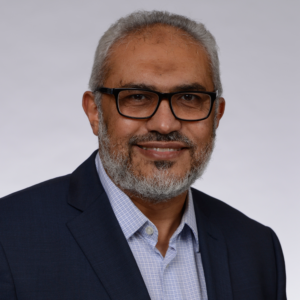
Amer Shalaby
Dr. Shalaby is Professor and Bahen/Tanenbaum Chair in Civil Engineering at the University of Toronto. He is the founding Director of the Transit Analytics Lab (TAL) and Co-Director of the Centre for Automated and Transformative Transportation Systems (CATTS). Dr. Shalaby is specialized in transit planning and scheduling, intelligent transit systems, transit operational management, transit system resilience, automated and connected transit technologies, and simulation and modelling of transportation systems. He has served on various technical committees and journal editorial boards. He also served on advisory panels of multiple transportation projects in Canada and internationally.
This free event was presented by the Department of Civil & Mineral Engineering Distinguished Lecture Series and co-sponsored by Mobility Network.
Above: Professor Baher Abdulhai (top row centre) at the Gateway to Growth Summit's breakout session "Tackling Congestion: Smart Infrastructure in the Zone," March 6, 2023. (Photo supplied by Toronto Region Board of Trade).
Professor Baher Abdulhai took part in the Toronto Region Board of Trade's Gateway to Growth Summit on March 6, 2023. He presented "Tackling Congestion with Intelligence" at the panel session entitled "Tackling Congestion: Smart Infrastructure in the Zone."
The session considered the question "What best-in-class smart infrastructure investments can help solve the crippling transportation gridlock resulting in huge costs and delays in getting products to market, choking the region’s growth potential?"
Abdulhai was joined on the panel by panelist Juan Pablo Bastida, Vice President, Public Sector, Geotab, and moderator Phinjo Gombu, Director, Economic Blueprint Institute, Toronto Region Board of Trade.
He gave a brief overview before discussing the universal cause of congestion: the demand for road capacity exceeding supply. He noted that Toronto is currently the seventh worst city in the world for congestion.
He discussed the typical solutions to congestion—reducing road capacity demand or increasing supply—before highlighting the use of intelligence to reduce congestion.
Abdulhai concluded with several promising smart applications that have the potential to reduce delays and total time spent in traffic by 20-50%:
- Adaptive Traffic Control using RL (deep reinforcement learning)
- Traffic Signals for Streets
- Ramp Metering and Dynamic Speed Control for Freeways with RL
- AV Headway Control with RL
- Dynamic Congestion Pricing: using Genetic Algorithms
- AVs for First and Last Mile
About the Gateway to Growth Summit
The Gateway to Growth Summit was a full-day event featuring expert presentations and discussion, presented by the Toronto Region Board of Trade and sponsored by Scotiabank and University of Toronto.
The area surrounding Pearson International Airport - the Pearson Economic Zone - is the second largest employment zone in Canada and the Gateway to Growth for our region. Home to a significant concentration of firms in advanced manufacturing, life sciences, logistics and warehousing, ‘The Zone’ sits at the heart of a network of highways, rail lines, and international goods movement, making its success vital to our economy and global competitiveness.
However, the Zone’s true potential remains untapped, restricted by transit availability for workers, road congestion, scarcity of employment lands, underinvestment in advanced manufacturing, and a lack of coordinated planning.
Toronto Region Board of Trade Gateway to Growth Summit
The Centre for Automated and Transformative Transportation Systems (CATTS) team at the University of Toronto invites you to their 6th annual symposium on July 6, 2023.

CATTS was established in 2017 with the purpose of quantifying and guiding the transformation of transportation systems in the era of rapid innovations in vehicular technologies and in provisioning of transportation as a service. CATTS is the first research centre of its kind in Canada to address the large-scale impacts of disruptive transportation technologies and services on our cities. It is a multi-disciplinary multi-sector collaboration that gathers academia, industry, technology experts, and the government. The centre’s mission is to guide societal transformation into a positive and sustainable direction, avoid the emergence of counterproductive travel trends, and emboldens Ontario cities as leaders in North America and the world.
Join us to learn about CATTS progress in its 6th year of research, and more.
The event will be hosted virtually and is free, but registration is required.
Agenda
9:00 a.m. Welcome and Opening Remarks, Professor Amer Shalaby
9:10-10:30 a.m. Session I - moderated by Dr. Toka S. Mostafa
Traffic Management and Control by Professor Baher Abdulhai
- Using AI-Based RM to Address Long Heavily Congested Freeways: A Case study on the QEW (Omar ElSamadisy)
- Headway Control for Autonomous Driving: A Case Study on the QEW (Lina Elmorshedy)
- Adaptive Traffic Signal Control: State-of-the-Art E-MARLIN Transformer (Xiaoyu Wang)
- SECRM: A safe, Efficient and Comfortable Automated Driving Model with RL (Tianyu Shi)
Public Transportation by Professor Amer Shalaby
- Advanced TSP (Wenxun Hu)
- Smart route management strategies (Kareem Othman)
- SPUR: Developing a Modular, Data-Driven Mesoscopic Simulation Platform to Analyze Stochastic Railway Networks (Peter Lai)
- Applications of generative AI to transit route management (Jiahao Wang)
10:30-11:00 a.m. Break
11:00 a.m. - 12:30 p.m. Session II - moderated by Dr. Toka S. Mostafa
Transportation Planning: Mobility as a Service (MaaS) by Professor Eric Miller
- Understanding the Dynamics of Vehicle for Hire Services in the Greater Toronto Area: A Comprehensive Study of Demand and Supply Patterns (Nael Alsaleh)
- Exploring Key Stakeholder Perceptions of Zero Occupant Vehicles (ZOVs)’s Impacts on Urban Areas (Lisa Losada Rojas)
Overview of AV and related MaaS Research by the Travel Demand Modelling Group (TDMG), Khandker Nurul Habib
- Modelling travel time perceptions towards autonomous vehicles in the GTHA (Felita Ong)
- Tracking Travel Demand Using Google Location History (Kaili Wang and Melvyn Li)
Transportation and Air Quality by Professor Marianne Hatzopoulou
- Implications of freight electrification scenarios for GHG emissions, air quality, health, and environmental justice (Sara Torbatian)
- Equity in the distribution of truck emissions in Toronto: Evidence from the past decade (Jad Zalzal)
Freight Modelling and Logistics by Professor Matthew Roorda
- Simulation of the performance of a person-following robot in crowded pedestrian environments (Farah Ghazzawy)
Computer Vision
- Computer Vision - Status update on North York Traffic Testbed (Kartikeya Bhargava)
12:30-1:30 p.m. Break
1:30-2:30 p.m. Guest Speakers' Session moderated by Dr. Toka S. Mostafa
1:30-2:00 p.m. "Insights on the Jacksonville Transportation Authority's Ultimate Urban Circulator Program," by Bernard Schmidt, Jacksonville Transportation Authority
2:00-2:30 p.m. "Combatting Escalating Congestion: What ITS and AI can do, cannot do, and what to expect," by Professor Baher Abdulhai
2:30-2:45 p.m. Closing remarks
Registration
Register on Eventbrite for this virtual event.
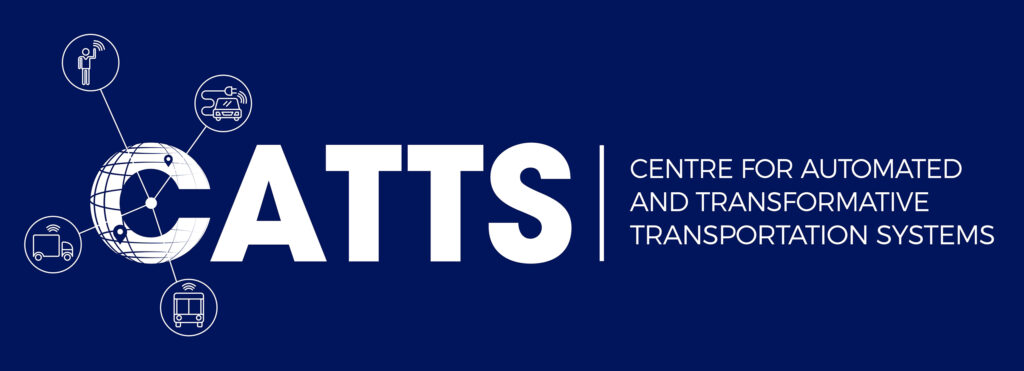
Download PDF of Public Transit Short Courses 2023 brochure
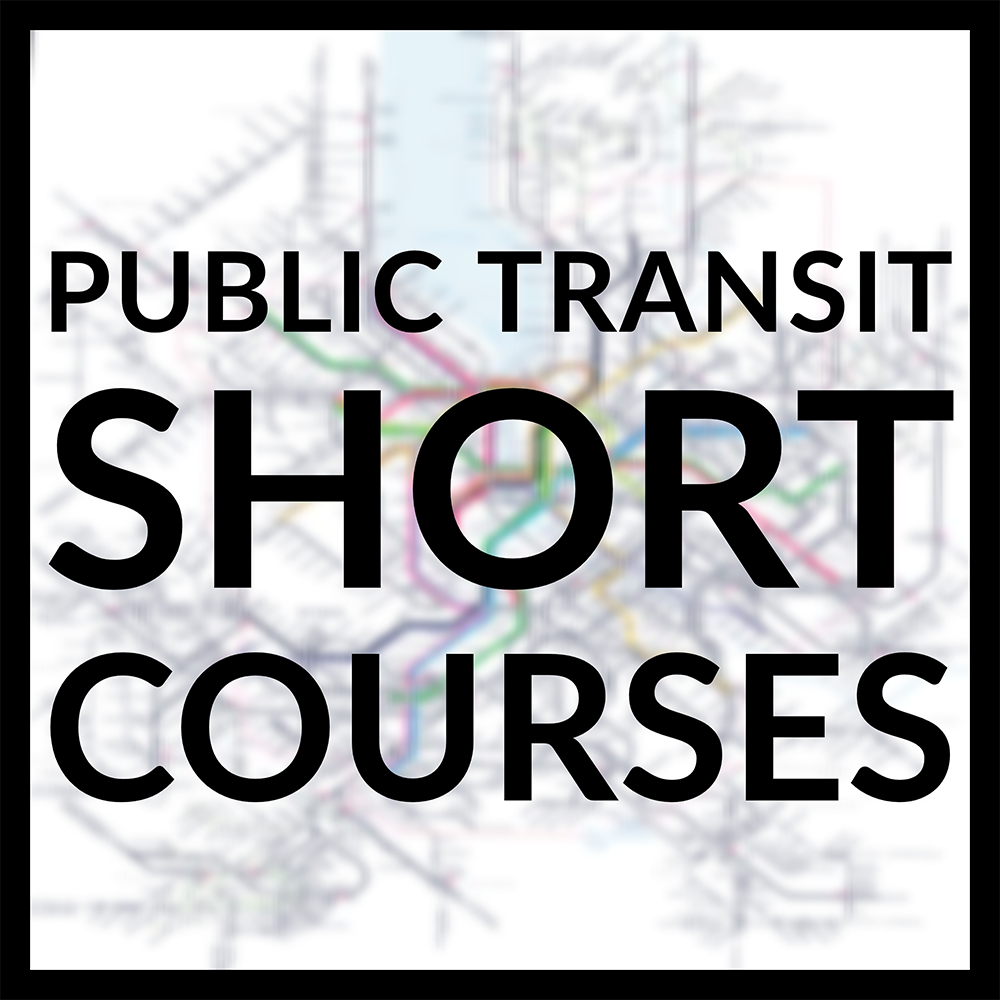
High quality public transit is the linchpin of liveable cities. Not only does it enhance mobility, accessibility, economic productivity, and help address climate change, but the COVID pandemic also illustrated its critical role in public health and ensuring the mobility of essential workers. Transit has always faced challenges in our auto-dominant society, but now faces an environment that is increasingly uncertain and turbulent. The last few years have highlighted the strategic importance of data, sophisticated analytics, and advanced technology such as Intelligent Transportation Systems (ITS), that enabled transit systems to respond more nimbly to the dynamic situation and the changing needs of customers. These tools are playing an increasingly critical role in the planning and operations of public transit, and need to be fully integrated into internal business processes.
The Transit Analytics Lab at the University of Toronto Mobility Network is offering two back-to-back courses designed to provide participants with knowledge on key concepts and best practices related to public transit service planning and technology. The first course, Public Transit Planning and ITS, provides an overview of key concepts and best practices related to transit planning, network and service design, service standards, transit and land use, and the application of ITS technologies. The second course, Public Transit Modelling, provides a complementary but more focused and advanced exploration of tools that can be used for forecasting demand at both the system and route levels, transit assignment, and microsimulation-based analysis. The courses will be taught by leading transit planning researchers and practitioners and will provide a balanced perspective on transit systems planning and ITS, including both state-of-the-art techniques and practical perspectives.
Course Outline
Who Should Attend?
The two short courses are designed for practising public transit professionals or those involved in the transportation and planning industry who have an interest in public transit planning and ITS. If you are new to the field and wish to have some formal exposure to the fundamentals, or if you have been practising for some time and wish to undertake a refresher and be exposed to recent state-of-the-art developments, then these short courses could form part of your professional development program.
It is expected that those involved in planning, designing and operating transit services at various levels of government will find value in the two courses. Consultants involved in traffic and public transit planning and ITS will also find the courses useful and relevant. Members of the general public with an interest in public transit are also invited to attend.
Course Organization
The two short courses are organized by the Transit Analytics Lab at the University of Toronto Mobility Network. The Mobility Network brings together experts from engineering, economics, policy, urban geography and planning and computer science. The network and its members are internationally renowned for high quality research in transportation from the perspectives of engineering, science and humanities.
Short Course Leaders
Dr. Hossam Abdelgawad has 18 years of experience in developing simulation models using a wide range of traffic software/ tools. He has ample experience in building models using AIMSUN, Paramics, UAF, Vissim, DynusT, HCS, Synchro, SimTraffic, EMME and Dynameq.
Brendon Hemily, PhD, is an independent consultant with 40 years of experience working with the transit industry in Canada and the US, and he serves as Senior Advisor for the Transit Analytics Lab. He has been involved in a wide range of projects related to the implementation of innovative service concepts and the effective use of advanced technology. Previously, he was Manager of Research and Technical Services at the Canadian Urban Transit Association where he worked for 15 years.
Professor Eric Miller is the director of the Mobility Network and a recognized expert in integrated land use transportation modelling and demand forecasting. He is the developer of GTAModel, a “best practice” regional travel demand modelling system used widely to forecast travel demand in the Greater Toronto Area. He is co-author of the textbook Urban Transportation Planning: A Decision-Oriented Approach.
Amer Shalaby is Bahen-Tanenbaum Professor in Civil Engineering and Founding Director of the Transit Analytics Lab at the University of Toronto, with 30 years of research and consulting experience in Canada and internationally in the areas of transit planning and intelligent transportation systems. His research has been published widely in peer-reviewed journals and international conference proceedings. He has served on various transit committees of the Transportation Research Board, and he sits on the editorial boards of multiple scientific journals.
Nigel Wilson is Emeritus Professor of Civil and Environmental Engineering at MIT focusing on urban public transport. He is Founding Director of the MIT Transit Lab, a major longterm collaborative research program with leading global public transport agencies including Transport for London (UK), MTR (Hong Kong) and the MBTA (US) which focuses on making better use of smart card and other automatically collected data to support decision-making throughout the agency. During sabbatical leaves from MIT, Professor Wilson worked in three large transit agencies, the MBTA, Metro Transit and TfL, and has served as consultant to a number of other North American transit authorities. He taught a short course in transit planning at MIT for twenty years which had a cumulative enrollment of over 400 transit professionals.
Fees
Acknowledgment
All amounts are in Canadian dollars. Registration covers attendance, course notes, lunches, coffee breaks and course completion certificate. Accommodation costs are not included in the registration fee. Upon receipt of your completed online registration form and payment, your registration will be acknowledged by email.
Registration Rates for 2023 Public Transit Short Courses
Notes
- All rates are HST inclusive in Canadian dollars.
- Early Bird rates, available until July 25, 2023, are discounted 15% from full registration rates.
- Registering for both courses is discounted 10%.
Register and pay online
Please complete two steps to register and pay for courses:
- Complete this registration form in full, and submit; and next
- After you submit your registration form, you will be re-directed to choose your course option and follow a link to a secure electronic payment site.
Location
Galbraith Building, Room GB202, 35 St. George Street.
Questions?
For inquiries about the course, please contact:
University of Toronto
35 St. George Street
The Transit Analytics Lab (TAL) of the University of Toronto brings together transportation and technology researchers from across the University of Toronto, transit systems in the Golden Horseshoe area, and private sector technology providers and consultants.
Among its objectives are to: foster innovation in transit data-driven tools (analytics) using advanced methods of data science, machine learning, artificial intelligence, simulation and statistics; expose the professional community through knowledge transfer activities to advanced analytics; build collaborations with public and private organizations; and establish U of T as a national and international leader in transit data analytics.
TAL was launched in 2020 with the International Symposium on Automated Transit Data. Since then, TAL has organized workshops and has been involved in a number of research pursuits, many of which have practical applications.
The time is appropriate to host our annual TAL Research Day workshop that will provide a high-level overview of the many research activities being pursued by the TAL team; please see the Draft Program below.
The TAL Research Day will be held virtually and is free, though registration is required.
Agenda
9:00 a.m. Introduction to the Transit Analytics Lab (TAL)
-
-
- Words of Welcome and Update on TAL Activities (Amer Shalaby)
-
9:15 Transit Analytics to Support Planning (Moderator: Brendon Hemily)
-
-
- Constructing Origin-Destination Demand Matrix using Wi-Fi and AFC Gate Count Data: A Case Study of Toronto’s Subway Network (Diego Da Silva)
- Trends in Toronto’s Transit Ridership Recovery: Insights from Subway Wi-Fi Records (Roger Chen)
- Modelling On-Demand Transit Ridership (Alaa Itani)
-
10:15 Break
10:30 Operations Analytics to Improve Rail Performance (Moderator: Amer Shalaby)
-
-
- Impact of Subway Service Disruption on User Mobility: Analysis and Visualization Using Customer Facing Wi-Fi Data in Toronto (Aidan Grenville)
- Short-term Prediction of Crowd Flows at Subway Stations using Wi-Fi Data and Graph Neural Networks Modelling (Diego Da Silva)
- Mitigating Subway Station Overcrowding via Passenger Inflow Control (Chandler White)
- SPUR: Modular, Data-Driven Mesoscopic Simulation Platform to Analyze Stochastic Railway Networks (Peter Lai)
-
11:30 Lunch Break
12:30 p.m. Keynote: A Conversation with John Levin on Transit Data and Analytics
- John Levin, Director-Strategic Initiatives, Metro Transit (Minneapolis)
1:30 Analytics to Support Bus Operations (Moderator: Brendon Hemily)
-
-
- Leveraging Large Language Models (LLMs) for Improving Public Transit Systems: An Exploration of GPT Models and State-of-the-Art Applications (Jiahao Wang)
- Extraboard Operator Planning and Scheduling Under Uncertainty (Jilin Song)
- Impacts of Transit Driver Advisory System with Space and Time Priorities on Route Performance (Kareem Othman)
-
2:30 Break
2:45 Analytics to Support Planning and Deployment of Zero Emission Buses (ZEBs (Moderator: Amer Shalaby)
-
-
- Insights from the Research on ZEB Deployment (Diego Da Silva)
- Optimization Model for Planning On-Route Charging Infrastructure and Schedules of ZEB Fleets (Lorna Licollari)
- Data-Driven Prediction of e-Bus Battery Consumption Rates using Machine Learning (Kareem Othman)
-
3:45 Wrap-Up
4:00 End of Research Day
Download the TAL 2023 Research Day agenda.
Registration
Register on Eventbrite for this virtual event.
Free. All are welcome.
If any specific accommodations are needed, please contact mobilitynetwork@utoronto.ca. Requests should be made as early as possible.


